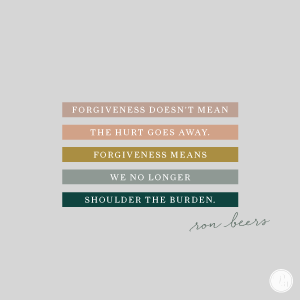
“Never pay back evil with more evil. Do things in such a way that everyone can see you are honorable. Do all that you can to live in peace with everyone … Don’t let evil conquer you, but conquer evil by doing good.” Romans 12:17-18, 21 (NLT)

Growing up I heard the adage, “Sticks and stones may break my bones, but words can never hurt me.” Is there a more inaccurate phrase?
Words hurt. They can do lasting damage, and once they are out of our mouths, words can’t ever be put back. As a dad, I remember my kids coming home from school or the playground with tears streaming down their faces from a hurtful remark. In those moments it would take every ounce of self-control and restraint to not let the Papa Bear start to roar.
Reflecting on those years, I’m struck by my kids’ willingness to forgive their offenders. While I would hold on to the frustration and wonder what kind of parent would let their child verbally hurt another child, my kids would accept the apology and soon be off playing and laughing again.
Personal offenses aren’t limited to childhood. As we mature, those seeming attacks from others can start to gnaw away at us. We get cut off in traffic, disrespected by a coworker or insulted by a spouse. In each case, we’re tempted to strike back, retaliate, give them their just desserts. But what does Paul say in Romans 12?
“Never pay back evil with more evil. Do things in such a way that everyone can see you are honorable. Do all that you can to live in peace with everyone … Don’t let evil conquer you, but conquer evil by doing good.”
What? That seems so unfair. So what about the times when we mess up? If we got what we truly deserved, we would be in deep trouble for sure. But Christ gives us grace — undeserved favor.
The grace Christ shows us is a guide for how we should treat others. The offender may deserve some judgment, but that’s not our job. By not reacting in anger and instead responding with good, we’re not excusing the bad behavior but showing a better way. We’re recognizing, forgiving and loving that person despite their misdeeds and sins against us.
When we respond in this way, we forgive them just as Christ forgave us. If we love someone the way Christ loves us, we’re more willing to forgive someone.
In a world that says I should do what’s best for myself, Paul’s command sounds almost impossible. When someone hurts me deeply, Paul says to show grace instead of giving them what they deserve.
Why does Paul tell us to forgive those who do evil against us? First, forgiveness may break a cycle of retaliation and lead to mutual reconciliation. Second, it may bring contrition on the other person’s part. Finally, repaying evil for evil hurts me just as much as it hurts my enemy. Even if the person acting against me never repents, forgiving them will free me of a heavy load of bitterness.
Forgiveness doesn’t mean the hurt goes away. Scars often stay with us. After all, even Christ still had the nail wounds in his hands. Forgiveness means we no longer shoulder the burden.
Lord, I admit my tendency to strike back, to return evil with evil. Forgive me. Help me to remember Your love and grace for me to do good to others, even those who hurt me. In Jesus’ Name, Amen.
1 Peter 3:9, “Don’t repay evil for evil. Don’t retaliate with insults when people insult you. Instead, pay them back with a blessing. That is what God has called you to do, and he will grant you his blessing.” (NLT)
Psalm 34:14, “Turn away from evil and do good. Search for peace, and work to maintain it.” (NLT)
Looking for practical answers to your real-life questions? The New Living Translation Life Application Study Bible provides powerful ways to apply the Bible to everyday life. This study Bible for both women and men offers wisdom from the teachings of real people in the Bible by exploring their accomplishments and learning from their mistakes. Whether you’re looking for a new Bible for yourself or searching for a gift for someone to cherish for years to come, get your copy at lifeapplication.com.
Enter to WIN a copy of the brand new Life Application Study Bible, Third Edition. Today’s devotion author, Ron Beers, is one of this Bible’s general editors. In celebration of this book, Tyndale is giving away 5 copies! Enter to win by leaving a comment here. {We’ll randomly select 5 winners and email notifications to each one by Monday, October 7.}
In what way do you think you may have been wronged recently by someone you know? In that situation, how will you respond with sacrificial forgiveness and unselfish grace?
© 2019 by Ron Beers. All rights reserved.
Proverbs 31 Ministries thanks Tyndale House Publishers for their sponsorship of today’s devotion.
Join the Conversation